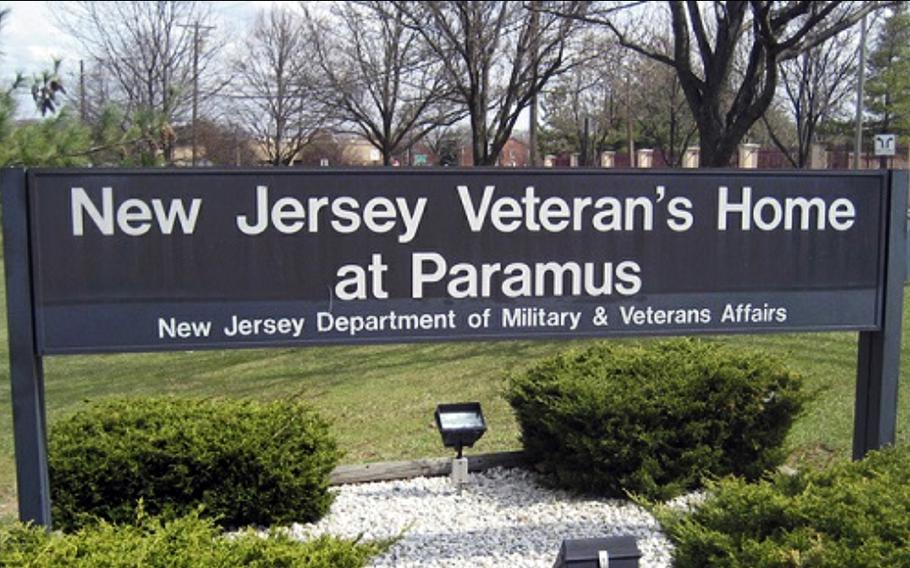
The state of New Jersey, which was accused of gross negligence and incompetence over its handing of the COVID outbreak in the state-run veterans homes, has agreed to a pay nearly $53 million to the families of 119 residents whose deaths were attributed to the coronavirus in the early days of the pandemic. (nj.gov)
(Tribune News Service) — The state of New Jersey, which was accused of gross negligence and incompetence over its handing of the COVID outbreak in the state-run veterans homes, has agreed to a pay nearly $53 million to the families of 119 residents whose deaths were attributed to the coronavirus in the early days of the pandemic.
An administration official, who confirmed the wide-ranging settlement on background, said the families on average will receive $445,000, based on arbitration proceedings.
“Cases settle for a variety of reasons. The families of those who have lost their lives to COVID-19 have gone through so much,” said the official. “This settlement will hopefully allow them to move forward without years of protracted and uncertain litigation.”
Two of the veterans homes — one in Menlo Park and a second in Paramus — reported some of the highest COVID-related death tolls in the nation. The coronavirus claimed the lives of more than 200 residents as the virus swept through the buildings, prompting the state to send in emergency assistance from the Veterans Administration and the National Guard.
Both facilities remain the focus of an ongoing federal investigation.
The out-of-court resolution comes despite a broad immunity granted to the New Jersey nursing homes early in the pandemic and to those “acting in good faith” in support of New Jersey’s COVID-19 response efforts. While not stopping all lawsuits, the state raised the bar in what might be considered negligence. Dozens of civil tort claims notices against New Jersey, though, were filed by attorneys for families of those who died while in the state’s care as the deaths in the veterans homes soared.
.Among the more egregious examples at the veterans homes that came to light were directives to staff not to use masks or gloves in the early days of the pandemic because it “might scare residents.”
Administrators of the facilities were accused of failing to institute proper infection prevention measures as the virus began running rampant — despite clear evidence of just how quickly COVID was spreading.
Lawyers for the families also charged that those in charge waited far too long before isolating confirmed or suspected COVID-19 residents, and that staff members who had tested positive for the virus, or those who had been exposed, were nevertheless still permitted to continue to work, as the veterans facilities struggled with severe shortages of medical staff and nurse aides. And they accused the state of failing to conduct timely tests of staff and residents.
In one of those cases filed on behalf of Rose Dente, it was alleged that the 99-year-old widow of a U.S. Army veteran died due to “gross departures from the standards of nursing care and infection control” at the Veterans Memorial Home in Menlo Park. The notice cited directives by the facility’s administration not to use masks and gloves, and permitting residents to congregate in common areas even after the administration knew that it had COVID-19 positive residents and staff in the building.
Under the terms of the settlement, which was obtained by NJ Advance Media, the state will pay 60% of the settlement, or $31.7 million within 90 days of the receipt of all “closing papers” from all plaintiffs in the case, including release and tax forms, as well as lien and judgment searches.
The total amount of the settlement is $52,955,000.
The amount each family will ultimately receive will depend upon the decisions reached in binding arbitration. The balance of the settlement will be paid on or before next July, or upon the reporting of the decisions regarding arbitration hearings.
Since the outbreaks at the veterans homes came to light, Brigadier General Jemal J. Beale, the adjutant general who oversaw the New Jersey Department of Military and Veterans Affairs, ultimately stepped down as part of a major leadership shakeup.
The administration subsequently appointed Dr. Lisa Hou as adjutant general and Commissioner of the Department of Military and Veterans Affairs. Hou previously served as the Joint Surgeon of the New Jersey National Guard.
The state also enacted legislation requiring weekly reports to the state health commission on veterans homes during all public health emergencies, mandating that veterans homes to keep family members or guardians of residents informed through quarterly town halls, and allowing family members to remove veterans from the state veterans homes during certain emergency circumstances.
A new law requiring nursing homes to increase staffing levels also meant the hiring of 78 nurses, aides and other employees at the three state-run veterans homes, where residents and families say short-staffing contributed to dire conditions and high death counts throughout the pandemic.
Officials say the three homes currently have an average vaccination rate of 96% among residents and an 88% booster rate.
Meanwhile, the federal investigation — begun under the Trump administration and continued by the Biden administration — is looking at violations of the Civil Rights of Institutionalized Persons Act. Specifically, the Justice Department has raised questions over whether the number of deaths in the veterans homes had been understated, and whether the state should not have ordered nursing homes to accept residents who had been treated for COVID-19 in a hospital.
The veterans homes are also the focus of a separate state investigation by the attorney general, which last year announced a wide-ranging look at how New Jersey’s long-term care facilities responded to the pandemic.
©2021 Advance Local Media LLC.
Visit nj.com.
Distributed by Tribune Content Agency, LLC.